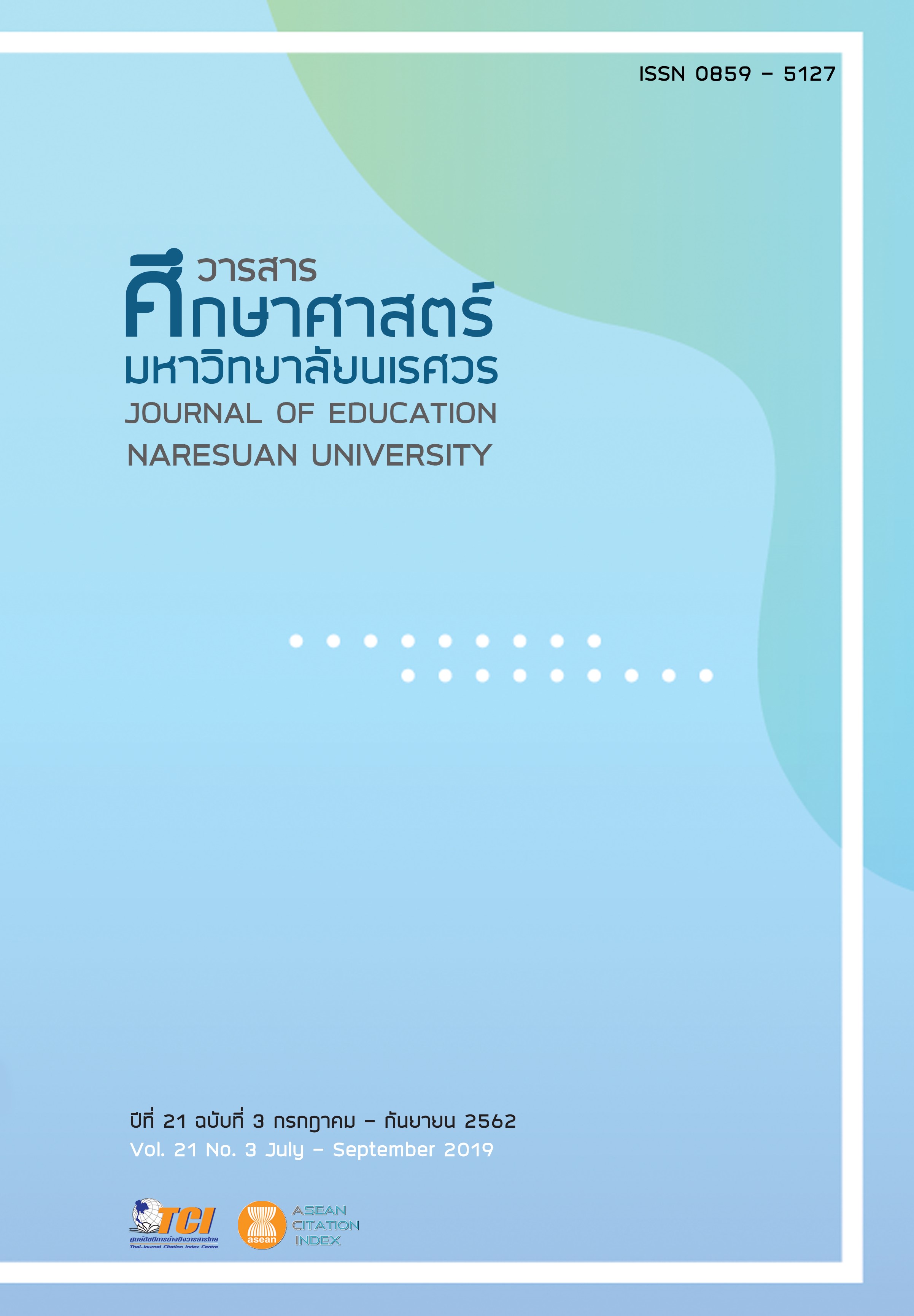แนวทางการดำเนินงานการพัฒนาคุณภาพการศึกษาด้วยเทคโนโลยีทางไกล ของสถานศึกษาสังกัดสำนักงานเขตพื้นที่การศึกษาประถมศึกษาเชียงใหม่ เขต 1 (OPERATIONAL GUIDELINES FOR EDUCATIONAL QUALITY DEVELOPMENT THROUGH DISTANCE LEARNING OF BASIC SCHOOLS UNDER CHIANG MAI PRIMARY EDUCATIONAL AREA OFFICE 1)
Main Article Content
Abstract
จุดมุ่งหมายของการวิจัยเพื่อศึกษาสภาพ ปัญหา ปัจจัยที่เอื้อต่อความสำเร็จ และพัฒนาแนวทางการพัฒนาคุณภาพการศึกษาด้วยเทคโนโลยีทางไกลของสถานศึกษาในสังกัดสำนักงานเขตพื้นที่การศึกษาประถมศึกษาเชียงใหม่ เขต 1 กลุ่มผู้ให้ข้อมูล คือ ผู้บริหารสถานศึกษา ครู ผู้รับผิดชอบโครงการ ผู้บริหารและครูโรงเรียนที่มีการปฏิบัติที่ดีและผู้เชี่ยวชาญ วิธีการและเครื่องมือ ได้แก่ แบบสอบถาม แบบสัมภาษณ์ การประชุมเชิงปฏิบัติการและแบบบันทึก การสัมมนาอิงผู้เชี่ยวชาญ และแบบตรวจสอบ วิเคราะห์ข้อมูลโดยใช้สถิติ ความถี่ ร้อยละ ค่าเฉลี่ย ส่วนเบี่ยงเบนมาตรฐาน และการวิเคราะห์เนื้อหา ผลการวิจัย พบว่า สภาพการพัฒนาคุณภาพการศึกษาด้วยเทคโนโลยีทางไกลของสถานศึกษา ในสังกัดสำนักงานเขตพื้นที่การศึกษาประถมศึกษาเชียงใหม่ เขต 1 มีการปฏิบัติ/เป็นจริง โดยรวมอยู่ในระดับมาก ปัญหา คือ งบประมาณไม่เพียงพอ ขาดบุคลากรในการซ่อมบำรุง สัญญาณอินเตอร์เน็ตไม่เสถียร นักเรียนสนใจน้อยลงในกรณีที่ใช้ DLIT เป็นเวลานาน การนิเทศไม่ต่อเนื่อง เครือข่ายมีการแลกเปลี่ยนเรียนรู้กันน้อย ปัจจัยที่เอื้อต่อความสำเร็จ คือ ความต่อเนื่องของนโยบาย ผู้บริหารมีวิสัยทัศน์ที่ก้าวไกล ครูมีความรับผิดชอบต่อหน้าที่ มีโครงสร้างพื้นฐานที่มีประสิทธิภาพ นักเรียนใฝ่เรียนใฝ่รู้ มีการนิเทศทุกช่องทางและวิธีการอย่างต่อเนื่อง มีภาคีเครือข่ายที่ช่วยเหลือสนับสนุนแนวทางการดำเนินงานการพัฒนาคุณภาพการศึกษาด้วยเทคโนโลยีทางไกล มี 5 ส่วน คือ หลักการ วัตถุประสงค์
วิธีดำเนินงาน ตัวชี้วัดและเงื่อนไขความสำเร็จ ผลการตรวจสอบความเหมาะสมและความเป็นไปได้โดยผู้เชี่ยวชาญ พบว่า อยู่ในระดับดีมาก
OPERATIONAL GUIDELINES FOR EDUCATIONAL QUALITY DEVELOPMENT THROUGH DISTANCE LEARNING OF BASIC SCHOOLS UNDER CHIANG MAI PRIMARY EDUCATIONAL AREA OFFICE 1
The purposes of this research project were to study state, problems, factors contributing to the success, and to development guidelines for educational quality through distance learning of basic schools under Chiang Mai Primary Educational Area office 1. Key informants consisted of school administrators, teachers who were responsible the project, school administrators and teachers of the best practice schools, and experts. The methods and tools were; a questionnaire, an interview form, workshop and a take-note, connoisseurship and an audit form. Data were analyzed by using frequency, percentage, mean, standard deviation, and content analysis. The research results were as follows: the state of educational quality development through distance learning of basic schools under Chiang Mai Primary Educational Area office 1 were the existence of practice/reality in overall at a high level. As regards the problems were as follows: budget was insufficient, the lack of personnel for fixing, the internet signal was unstable, students were not interested in a case of using DLIT for long periods, the supervision was discontinuously and there were a little of collaborative development network and learning exchange. Moreover, the factors contributing to the success were: the continuous policy, the administrators had wide vision and teachers knew their roles and functional responsibilities; the basic infrastructure was efficiency, the students’ intention to acquire learning, there was supervision in all channels and all methods continuously including, the party network supporting. Regarding the results of auditing the appropriate and feasibility by experts, it was found that it was at the highest level.
Article Details
The owner of the article does not copy or violate any of its copyright. If any copyright infringement occurs or prosecution, in any case, the Editorial Board is not involved in all the rights to the owner of the article to be performed.
References
2. Chiang Mai Primary Educational Service Area Office 1. (2015). Educational Quality Development in Schools under Chiang Mai Primary Educational Service Area Office 1. Chiang Mai: Chiang Mai University. [in Thai]
3. Chiang Mai Primary Educational Service Area Office 1. (2017). Budget allocation information. Chiang Mai: Chiang Mai Primary Educational Service Area Office 1. [in Thai]
4. Chiang Mai Primary Educational Service Area Office 1. (2017). The development plan of educational quality assurance, Chiang Mai Primary Educational Service Area Office 1 annual year 2018. Chiang Mai: Chiang Mai Primary Educational Service Area Office 1. [in Thai]
5. Faculty of Education, Chiang Mai University. (2015). School Administrative strategies for Excellence of Using Technology for Education. Chiang Mai: Faculty of Education, Chiang Mai University. [in Thai]
6. Joosuay, S. (2009). The administrative management process of distance learning of small-sized schools under Prachuapkirikhan Primary Educational Service Area Office 1 (Master thesis). Nonthaburi: Sukhothai Thammathirat Open University. [in Thai]
7. Manim, Y. (2016). Guidelines for administration distance education under Nakhon Sawan Primary Educational Service Area Office 2 (Master thesis). Nakhon Sawan: Nakhon Sawan Rajabhat University. [in Thai]
8. Ministry of Information and Communication Technology. (2016). Digital economy and society development plan. Bangkok: Ministry of Information and Communication Technology. [in Thai]
9. Office of the Basic Education Commission. (2016). Guidelines for the quality development of distance learning (DLTV). Bangkok: The Agricultural Cooperative Federation of Thailand. [in Thai]
10. Office of the National Economic and Social Development Board. (2016). The twelfth national economic and social development plan (2017-2021). Government Gazette, Vol. 133, Part 115a. [in Thai]
11. Pornchartnitiwong, A. (2013). Factors affecting the success of the quality development system of distance learning through information technology (Master thesis). Bangkok: King Mongkut’s University of Technology Thonburi. [in Thai]
12. Tangutairuang, T. (2018). Research synthesis in Thai educational leadership – a meta analysis. Journal of Education Naresuan University, 20(1), 75 – 88. [in Thai]
13. Techa, K. (2015). A strategic proposal for educational management by distance learning (DLTV) of Baan Maekham, Chiang Saen District, Chiang Rai Province. n.p. [in Thai]
14. Thacha, W., Suteejariyawat, P., & Pongpinyo, R. (2018). E-Learning development for professional learning community in Mahamakut Buddhist University, Isan Campus: A participatory action research. Journal of Education Naresuan University, 20(1), 139 – 150. [in Thai]
15. Thailand Development Research Institute. (2015). TDRI’s report: Strategic planning management for basic educational reform causing responsibility. Bangkok: Thailand Development Research Institute. [in Thai]
16. Udommunthaworn, P. (2012). Project evaluation of Kraikangwon Satellite Distance Learning Program in school under the Office of Chonburi Educational Service Area 1 (Master thesis). Chonburi: Burapha University. [in Thai]
17. Wannasiri, W. (2015). Distance education management Via Satellite in Basic Education under Kanchanaburi Primary Educational Service Area Office 1 (Master thesis). Kanchanaburi: Kanchanaburi Rajabhat University. [in Thai]
18. Wantana, P. (2009). The opinions of school administrators and teachers in organizing activities of distance learning of schools in Mae Hong Son Educational Service Area Office 2 (Master thesis). Chiang Mai: Chiang Mai University. [in Thai]
19. Watcharothai, K. (2003). Distance learning: Long live education with technology. Bangkok: Amarin Printing & Publishing Public. [in Thai]


